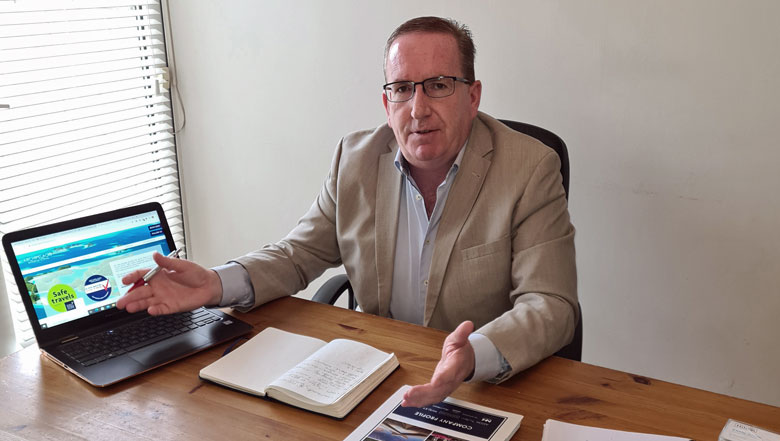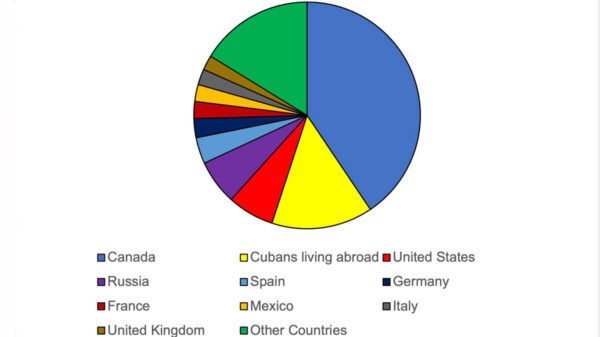Archipelago International, Southeast Asia’s largest privately owned and independent hotel operator announced its most recent expansion in Cuba with a press release in July 2020. Two properties will be rebranded under Archipelago’s ASTON name on December 1, the beginning of the high tourist season on the Island.
In this interview, we spoke with Gerard Byrne, Managing Director of Archipelago Overseas. In addition to its strong growth in Indonesia, the Company has in recent years, focused on international expansion, primarily in the Middle East (Saudi Arabia and the United Arab Emirates) and Cuba.
Archipelago’s involvement in Cuba began in late 2015 following a meeting request from the Cuban ambassador in Jakarta. As a result of this event, Mr. Byrne and CEO John Flood were invited to Cuba to meet with the hotel company, Grupo de Turismo Gaviota S.A.
Mr. Byrne, from Ireland, holds 25 years of experience in the corporate banking, real estate and consulting sectors, with a strong focus throughout his career in the hospitality and leisure industries.
He is an MBA graduate from the University College of Estate Management at the University of Reading (UK) and a Chartered Fellow of the Chartered Management Institute, UK.
Archipelago currently manages five hotel and resort projects at various stages of development throughout the Island. Those properties include the ASTON Panorama Hotel (Havana), ASTON Costa Verde Beach Resort (Holguin) and GRAND ASTON Cayo Las Brujas Beach Resort & Spa. Currently under construction and scheduled to open in 2021 are the GRAND ASTON Varadero Beach Resort and the GRAND ASTON La Habana Hotel.
Cuba Business Report: Tell us how Archipelago International, an Indonesian hotel chain, became involved in the Cuban hotel market?
Gerard Byrne:
Back in late 2015 we were invited to a meeting with the Cuban Ambassador to Indonesia. At this meeting, an invitation was extended to visit Cuba to meet with key stakeholders in the Cuban hotel industry and to inspect a number of hotel and tourism projects.
As a result, in early 2016, myself and our President & CEO John Flood visited Cuba for the first time. We were very impressed by the people, by the island’s natural beauty and by the amount of development that was happening on hotel and tourism projects. It was clear to us that Cuba had spent many years investing in and developing its tourism infrastructure.
It was also evident that they needed the assistance and investment of international hotel operators who could improve the quality and standards in their hotels on the island. Having grown our company in a developing country over a period of 20 years, we understood the many challenges the Cubans faced and knew that we could add significant value and assistance to the industry there.
It is fair to say that this initial visit to Cuba made a significant impression on us. At the time, I was finishing my MBA and decided to redirect the topic of my thesis paper to focus on what was happening there. The title of my paper was ‘Real Estate Development and Tourism in the New Cuban Revolution’. The title referenced changes I was seeing at the time both geopolitically and culturally but more importantly the paper gave us the research and knowledge essential to begin doing business in Cuba.
From there we started competing for management contracts on new hotel projects and in 2018 our perseverance was rewarded with our appointment on a first project, Grand Aston Varadero Beach Resort, which is currently under construction and is due for completion mid next year.
Cuba Business Report: An investment in Cuba’s tourism sector brings jobs to the local economy. How do your hotels benefit job creation and what opportunities do you bring to the Cuban employees who work at the ASTON hotels?
Mr. Byrne:
Yes, it is true to say a hotel investment brings many jobs to the local economy and in fact, globally travel and tourism is not only one of the biggest industries (accounting for 10.3% of global GDP) but also one of the biggest employers (330m or 1 in 10 jobs). To clarify, the vast majority of the investment in and development of hotels in Cuba has been undertaken by the Cuban government. So, we are not investing in the real estate asset but rather we are investing in the infrastructure and talent to support our operations on the island and to ensure the effective training and transfer of knowledge to local Cuban staff in the hotels.
The Cuban staff benefit from extensive training to international standards, they get insight into our culture and experience, together with having the opportunity to earn some valuable foreign currency through tips. Local businesses also benefit as we try to source as much as we can locally both in terms of products and services.
To support our hotel projects in Cuba and staff training in particular, we have sent several task forces to Cuba from Indonesia. Typically, these consist of 10+ senior corporate staff who spend at least one month in Cuba at a time. In addition, during the COVID-19 crisis, we made the decision to keep our foreign staff (department heads and corporate staff) in Cuba to continue to work on our ongoing projects and to assist with operations on the ground. We are also investing in the establishment of a regional corporate office in Havana which will employ local as well as international staff when it is up and running.
Overall, our investment to date has been significant, however we are investing for the future and see Cuba as a long-term part of our regional development strategy.
Cuba Business Report: Archipelago recently received the ‘Safe Travels’ certification from the World Travel & Tourism Council (WTTC). This certification recognized Archipelago’s commitment to keeping guests and employees safe and healthy with the implementation a number of ‘new normal’ safety protocols for all of your hotels. What strategies are in place to ensure the safe travel experience of hotel guests and staff in Cuba?
Mr. Byrne:
We as a company have taken a multi-layered approach to reassure our guests, staff and partners. Initially, we implemented new COVID-19 Standard Operating Procedures in each department, hotel and corporate office. These covered the full spectrum of hygiene, masking wearing, safety, and cleaning protocols.
In addition, we were the first hotel chain to implement company wide testing for all staff. We now have clear and unequivocal data from our hotels and our corporate office that potential customers are choosing our hotels over other brands because they are seeing our ‘Safe Travels’ certification and our ‘Trusted Safety Warranty’ that all hotel employees are regularly tested. Guests and travel partners can be assured that the same levels of safety and hygiene will be experienced at our hotels in Cuba.
Cuba Business Report: Did you work with the Ministry of Tourism on these safety protocols?
Mr. Byrne:
Being based in Southeast Asia meant that our understanding of previous virus outbreaks (SARS & Swine Flu) and of early COVID-19 data gave us a head start in being able to react to the current crisis.
At a very early stage we presented a paper to the President of Gaviota outlining the type of protocols and strategies that needed to be implemented in Cuba. We advised that Cuba needed to take a holistic approach that involved all sectors related to tourism including hotels, airports, transport etc.
As the crisis developed, we presented a second paper which outlined further detailed standard operating procedures and recommendations on a regular testing regime. We are proud that many of our recommendations have been incorporated in the protocols that are now in place.
Cuba also took advice from many other stakeholders in the aviation, travel and transport sectors and today has a comprehensive playbook of policies across the entire tourism spectrum, which will ensure a very safe travel experience for guests.
In addition to all the now-standard social distancing, mask-wearing, hygiene, and cleaning protocols, Cuba has utilized its excellent healthcare system to ensure that there are medical centers in all resorts and testing facilities in each destination so that any localized outbreak can be traced and contained. This includes keeping local Cuba staff in resort destinations during work weeks and extensive staff testing which ensures close monitoring of the situation in tourist destinations.
Cuba Business Report: What does the future hold for Archipelago International’s ASTON brand of hotels in Cuba? Are there plans for further investment?
Mr. Byrne:
In addition to Grand Aston Varadero Beach Resort we have been awarded a further four hotel management contracts on projects in Cayo Santa Maria (Grand Aston Cayo Las Brujas Beach Resort & Spa – our first operational hotel), in Holguin (Aston Costa Verde Beach Resort – Reopening in December 2020) and in Havana (Grand Aston La Habana – Opening in mid-2021 and Aston Panorama Hotel – Reopening in December 2020). In total, we will have 3,000 rooms under management in Cuba in the short-run however I feel there is still plenty of room for growth of the Aston brand on the island.
In addition to our trusted Aston brand, Archipelago has a further nine hotel brands which cover the full spectrum of hotel classifications, from hostels to luxury five-star hotels. We therefore have the brands and the enthusiasm to grow our Cuban portfolio further. This is why we are establishing a corporate office in Havana and are investing for the future. As our brand recognition and reputation increases, I am confident that our success in Cuba will lead to further expansion opportunities, new partnerships in the region and further growth in Latin American.
Cuba Business Report: What in your view are Cuba’s unique selling points (USPs) in a post-COVID context?
Apart from the obvious one (great climate/weather) I think Cuba has several unique selling points. Firstly, in a post-COVID context I think the environment will be even more on travellers’ minds, given what we have seen in the likes of Venice, where the canals became clean with no tourists visiting for several months. Cuba has a strong focus on protecting its natural habitats and this is done at the master planning stage.
It’s also admirable how they design and develop their resort hotels, with low rise buildings barely visible from the sea. Mangrove protection, wildlife sanctuaries and parks are prioritised but these are just some examples. To me, Cuba’s diverse ecosystem and strategic focus on environmental protection is very important.
Secondly, Cuba’s global reputation for quality healthcare has been brought to the fore during this crisis, from its antiviral drugs being used in China at the beginning, to teams of Cuban doctors working in the most dangerous epicenters of the virus. It has also been very successful at containing the virus, with very low case and death rates compared to many popular destinations globally. This will be an important consideration in the decision-making process of future guests.
Finally, Cuba has always been a very safe destination with zero incidences of terrorism. It is only a few years since tourism in places like Europe and Egypt was seriously disrupted by terrorism. So, having those three USP’s of environmental, health and safety in one destination gives it a distinct advantage over many of its competitors.
Cuba Business Report: Mr. Byrne, it was great talking with you. Thank you for taking the time to share your thoughts and discuss Archipelago’s ASTON hotel expansion plans. It’s good to see that in spite of the current limitations which include the current pandemic, investment is moving forward in Cuba.

T.K. Hernández is co-founder and editor at Cuba Business Report. Her work has been published in various online news media publications. Hernández has supported fundraising for Cuba’s last two hurricane disaster relief campaigns and is a member of the Canadian Network on Cuba. She is also a member of The Writers Union of Canada, and ACES International Alliance of Editors. Ms. Hernández is the author of three books, most recently, “The Cuba Interviews: Conversations on Foreign Investment and Economic Development,” (Palgrave Macmillan, 2023).














